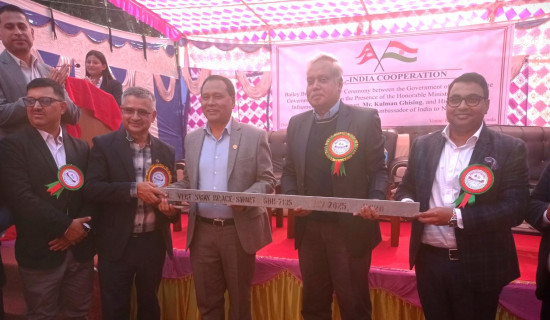- Friday, 21 November 2025
Toilets Still Missing
World Toilet Day is marked on November 19 every year to raise awareness about the global sanitation crisis as well as the urgent need for decent toilets and sanitation for everyone. The goal is to spur action to address the crisis, promote public health and meet Sustainable Development Goal 6, which calls for universal access to water and sanitation for all.
Speaking at an event organised by the Ministry of Water Resources and Energy Development of Karnali Province to mark World Toilet Day, Secretary at the Ministry, Mohan Kumar Shakya, said that 3 per cent of households in Karnali remain without a toilet and that 30 per cent of toilets built during the open-defecation-free campaign are rudimentary or temporary and need urgent upgrading.
The news comes years after the Karnali Province was declared an open-defecation-free zone in June 2018 after toilets were built in all households, and Nepal was declared an open-defecation-free country on October 13, 2019. While the provincial government has allocated around Rs. 1.5 billion for drinking water, there is no dedicated budget for sanitation. Secretary Shakya also clarified that the government has no policy of providing household subsidies for toilet construction.
These revelations highlight the urgent need for continued support to build latrines in backward provinces like Karnali for the sustainability of the sanitation campaign. Since the campaign began in 2010, the nation is said to have built 5.66 million toilets and invested nearly Rs. 75 billion in the sector. Improved sanitation has helped reduce diseases such as diarrhoea. But this achievement masks an unpalatable truth: not enough of them have been built, and many have now fallen into disrepair. Even in major urban centres like Kathmandu, one has to struggle to find a public latrine, let alone a well-managed one, to relieve oneself.
When talking about latrine and sanitation, the 2009 cholera outbreak in Jajarkot comes to mind. The outbreak killed over 300 people and infected thousands more, plunging the entire village into mourning. Even a team of health professionals dispatched from Kathmandu struggled for weeks to contain it. Subsequent research linked the disease to the contamination of the drinking water source as a result of open defecation.
The importance of the toilet goes beyond sanitation. It is about the dignity and safety of communities, especially girls and women, who otherwise have to venture out of the house, sometimes in the dark, to defecate in the open. There have been countless instances where a lack of easy access to latrines has seriously imperilled children's health, sometimes forcing them to use dirty, unsafe pits, go in the open or miss school. This is especially true for girl students in rural settings during their periods.
That latrines are truly lifesavers is a well-documented fact. Exposure to faecal matter is a leading cause of diarrhoea, a dreaded disease reported to kill thousands of people nationwide, mostly children. Districts that were declared open-defecation-free only a few years ago have now reported outbreaks of cholera and other water-borne diseases due to a lack of sanitation. As the country is prone to floods and landslides, its water sources face a relatively higher risk of contamination. Needless to say, open defecation is a serious risk to health and safety. Access to a toilet should be a basic human right, not a luxury only the rich can afford.














